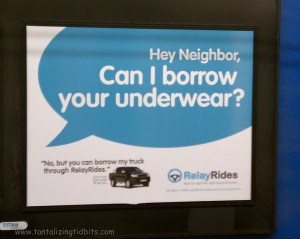The Future Of Fractional Ownership

In a lot of ways, the sharing economy is helping to reduce peak demand for goods and services. That guests can rent rooms on Airbnb during SXSW is a more efficient use of resources than if the Austin hospitality industry decided to build a whole bunch of hotels just to deal with one week of visitors. And Getaround or Relayrides renters are helping to make use of cars that otherwise go unused most of the time.
But the thing about the sharing economy is that, at least when it comes to marketplaces like Airbnb or Getaround, it still relies on a lot of people owning a lot of things. And if we’re talking about true efficiency, it seems to me that we’re going to need to go a step beyond just the owner-renter model for the collaborative consumption market, and into an area that’s based on fractional ownership of goods.
Fractional ownership is not a new idea — vacation time-shares have been around forever, for instance — but it could be applied more broadly and more efficiently in more markets. One prime example is in the way people own and use cars: It’s no surprise that most vehicles go unused 23 or 22 hours out of the day. And the various car- and ride-sharing services are getting users one step closer to not needing their own vehicles, at least in urban areas and at least part of the time.
But what if, instead of most people on my block owning a car that sits parked the vast majority of the time, each of us shared ownership of a vehicle or group of vehicles in the neighborhood. Sure, I can rent nearby neighbor’s cars today on an a la carte basis, but that still requires a person to purchase, pay insurance for, and maintain that vehicle for himself, me, and anyone else who wants to use it. For those of us who don’t own our own vehicles, there’s also the tricky matter of insurance, and who’s to blame or who will cover for an accident that happens in someone else’s car.
On-demand car rental services like Zipcar have gotten us one step closer to answering at least some of those questions. But the infrastructure around Zipcar has its own inefficiencies: It has built its fleet to handle peak demand, and so it’s cars, also, go unused a lot of the time. As a result, it tends to be more expensive than the real sharing economy of car rental startups.
Anyway, I don’t want to rent a car by the hour or by the day, whether it be a neighbor’s car or one from Zipcar. What I really would like is to be able to share a car along with other people in my neighborhood and find a way to finance, manage insurance, and manage booking in a single dashboard. I want to be able to subscribe to a service where I’m paying for access to get around when I want, with insurance (and maybe gas) built in. Where a car sits in a shared lot and is maintained by someone else.
Ultimately, I think this is where the auto industry is headed — or at least where it should go. At some point, U.S. auto manufacturers will likely find that people are buying fewer cars and hopefully holding onto them longer. That sharing economy companies are allowing those who previously owned a car to be able to go without. And when that happens, I think it will make more sense for automakers to set up their own Zipcar-like lots in major cities and to lease access to their vehicles rather than sell them outright.
Of course, the same efficiency model could be applied to other goods: Why should everyone in the suburbs buy their own lawnmowers when they could all use the same, jointly owned piece of equipment? Why build an Airbnb for boats when you can build a platform for fractional ownership of a boat? And the old standby — why Airbnb a vacation home to others when you could have ownership of it with a group of others?
We know that these models can work as long as we have the right tools to manage them. The question is, who’s going to build us this future based on fractional ownership?



No comments:
Post a Comment